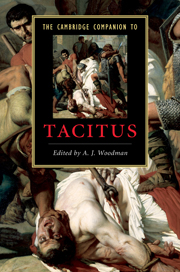Book contents
- Frontmatter
- Introduction
- Part I Contexts
- Part II Texts
- Part III Topics
- 10 Tacitus’ personal voice
- 11 Tacitus as a historian
- 12 Res olim dissociabiles: emperors, senators and liberty
- 13 Style and language
- 14 Speeches in the Histories
- 15 Warfare in the Annals
- Part IV Transmission
- Chronological table
- Abbreviations and bibliography
- Index
10 - Tacitus’ personal voice
from Part III - Topics
Published online by Cambridge University Press: 28 March 2010
- Frontmatter
- Introduction
- Part I Contexts
- Part II Texts
- Part III Topics
- 10 Tacitus’ personal voice
- 11 Tacitus as a historian
- 12 Res olim dissociabiles: emperors, senators and liberty
- 13 Style and language
- 14 Speeches in the Histories
- 15 Warfare in the Annals
- Part IV Transmission
- Chronological table
- Abbreviations and bibliography
- Index
Summary
“As for myself, Galba, Otho, and Vitellius were not known to me through doing me either good or harm. I would not deny that my career owed its beginnings to Vespasian, its advance to Titus and its further progress to Domitian; but those who have promised to be unbiased must describe everyone without either affection or hatred. If I live long enough, I have reserved for my old age the richer and less troublesome material of the principate of the deified Nerva and the rule of Trajan, in this rare delight of the times when you can think what you like and say what you think.” (H. 1.1.3-4) / “Soon it was our hands that led Helvidius to prison; it was we who were shamed by the looks and the sight of Mauricus and Rusticus; it was we who were drenched by Senecio's innocent blood. Nero would at least remove his own eyes from such sights, and he ordered rather than viewed his crimes; it was a special part of the suffering under Domitian to see and be seen, when our sighs were noted down, when that savage, red face with which he fortified himself against shame was sufficient to mark out the pallor of so many men.” (Agr. 45.1-2) / “There was also the death of Junia, in the sixty-fourth year after the fighting at Philippi. She was the niece of Cato, the wife of C. Cassius and the sister of M. Brutus. Her will produced much talk among the people, because she was a wealthy woman and she mentioned in complimentary terms virtually all the leading men of the state, but made no mention of the emperor. That was taken in a way appropriate to a fellow-citizen, and Tiberius did not forbid the funeral to be celebrated with the eulogy from the front of the rostra and the other customary honours. Twenty funeral-masks of the most distinguished families were carried before the bier, and the names of Manlii and Quinctii and other similar nobility were to be seen. But the most glittering of all were Cassius and Brutus, for the very reason that their likenesses were not on view.” (A. 3.76)
- Type
- Chapter
- Information
- The Cambridge Companion to Tacitus , pp. 147 - 167Publisher: Cambridge University PressPrint publication year: 2010
- 2
- Cited by

